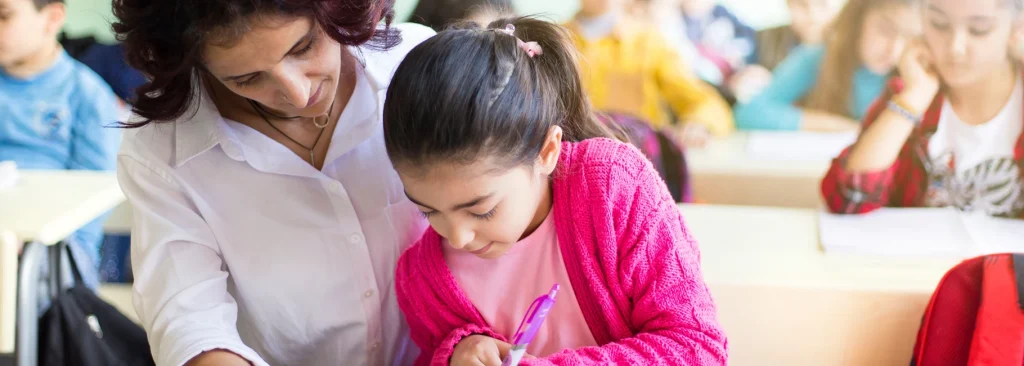By Nat, WiseStart™ and IvyWise College Admissions Counselor
We say this all the time: the earlier you start on college prep the better. But how early is too early? The reality is that colleges look at everything from ninth grade on — meaning students need to show up on day one of high school ready to go. Preparing for day one, however, isn’t about drilling SAT/ACT questions and over-scheduling students with activities. It’s much more about developing the soft skills necessary to be successful in high school and beyond.
Inside Insights on Middle School Prep
As a college counselor at an independent school, I was grateful to have the opportunity to work with my students beginning in the ninth grade, mostly because it made college counseling much easier. Starting so early allowed me to develop a relationship with them, which was quite different than being assigned to my students during the second semester of junior year — which is still the center of gravity at some of the most visible independent schools in the country. In getting to know my students and their families so well, I was also responsible for preparing them for college, not just getting them in.
There are a few major academic transitions for students, with one of those being the jump from the expectations in eighth grade to the expectations and workload in ninth grade. I often see students who are so gifted academically they never had to develop study skills to do well in middle school, and this catches up to them in high school — which is not an ideal time to learn something new at the expense of performance in their courses.
From a student development perspective, I believe it’s important to work with my students even before the ninth grade to help develop the skills I know will be so important as they enter high school. I often tell my students that getting a good grade in class doesn’t necessarily mean they performed well in class. I also emphasize the difference between getting a good letter of recommendation and getting a helpful letter of recommendation. The key components in both examples are skills that can and should be developed before ninth grade.
Develop 4 Key College Prep Skills
As a counselor, it is my job to meet all my students where they are regarding their study, executive functioning, and social-emotional skills and administer an action plan to try to strengthen those abilities and work on areas of opportunity. Framing my job as preparing my students to be successful in college instead of just getting them accepted to college requires a tremendous amount of thoughtful planning, teamwork, and execution.
I spend a lot of time working with my students to develop:
- Introspection.
- Self-advocacy skills.
- Self-awareness.
- Good study habits.
Skill 1: Introspection
When looking at soft skills from the perspective of a former college admissions officer, I think one of the most important skills students need to develop is their ability to be introspective. Some of the brightest students struggle with this, and because of that so much of the planned lessons I work on with my students are thoughtfully crafted to develop this skill over time. Things like journal writing, inspiration boards, and other tools were borrowed from various other experiences and instituted purposefully.
One of my favorite lessons to promote introspection (among other attributes) with my younger students is to show them Simon Sinek’s, “Start with Why” TedX talk video. This video encourages students to be introspective and thoughtful about their motivations and narrative, and how, in turn, to go after their dreams.
Without introspection, students don’t fully understand why they are going to school in the first place (other than they are “supposed to”). I find my students felt much more empowered when they were able to ascertain what they wanted from school, and then plan their path to achieve what they wanted. Additionally, I find that students who write the most effective essays are deeply reflective in their writing and thinking ability, and this all comes from introspection.
Skill 2: Self-Advocacy
Self-advocacy is having the maturity to ask for help when you need it, and best used before you may need it. Developing this skill effectively is nuanced, though, because it’s not necessarily only the ability to speak up in one’s own best interest but also, and perhaps more importantly, knowing when to step back and let others have a turn. This comes from self-awareness. These skills are not developed independently but must be developed together to benefit from one another.
Skill 3: Self-Awareness
Regarding self-awareness, so much of this development can be accomplished simply by taking an assessment of a student’s baseline study skills (which I’ll cover next) and then working to build their skillset based on that assessment. Oftentimes, students don’t know what they should be doing inside and outside of the classroom, and so the baseline assessment is often an “ah ha!” moment.
On a deeper level, self-awareness is recognizing class dynamics and knowing how to best play into them during a class discussion. There are so many different techniques that I use with my students in terms of helping them become more aware of their surroundings and what factors influence their performance.
Skill 4: Study Habits
Self-advocacy and self-awareness also benefit from good study habits and planning so that a student can ask for help on a long-term project before it’s too late to get help. It goes without saying that these skills are essential for success in high school and college, and the earlier a student can develop them, the better prepared they will be.
In my experience, a significant portion of ninth graders are still developing their study skills once they enter high school, and that can often hamper their performance in the classroom. If colleges are looking at all four years of grades and activities, and students are struggling to develop their study skills in ninth grade, they’ll have an even bigger hole to dig out of as the school year progresses.
Simple skills coaching that helps students with their executive functioning skills in middle school, including developing good study habits, can go a long way toward setting them up for success in high school and help build upon their self-advocacy and, in turn, self-awareness.
We’ve always talked about hard and soft factors in college admissions, and it’s exciting to challenge students in order to develop some of the most important soft factors. Developing these skills early sets students up for success once they reach high school and makes college prep much easier as they approach the actual application process. And of course, these skills will support them in successful outcomes far beyond gaining admissions to college.
Early College Prep Tips
Planning for college in middle school involves laying the foundation to get high school off to a strong start. Students in middle school can work on developing critical skills, exploring their interests through extracurriculars, and identifying academic subjects in which they excel or need improvement.
Sixth Grade Prep
Middle school college prep starts with developing good study habits. Sixth graders can do this by:
- Setting a consistent time every day to do homework.
- Breaking tasks down into manageable chunks.
- Learning effective note-taking techniques.
- Staying organized.
Additionally, students can begin practicing self-advocacy by seeking help from teachers, parents, or tutors if they are struggling with any subject. It’s important to address any areas of weakness early on, since classes will increase in rigor each year. Outside reading is a great way to improve overall academic performance, plus it helps students develop better vocabulary, comprehension, and critical thinking skills.
Seventh Grade Prep
College prep for seventh graders involves building on the skills developed in sixth grade and expanding the depth and breadth of courses. Some middle schools offer foreign language classes in seventh grade, in addition to advanced or honors courses. Students should take advantage of these opportunities now, not only to prepare for a more rigorous high school curriculum but also to get an early start on foreign language requirements — with the possibility of taking AP language courses later in high school.
This is also a great time to start exploring different career paths through online research or talking to adults with interesting jobs, which can help students narrow down their academic and extracurricular focus later on. As students become more involved in extracurriculars, they will also need to work on their time management skills to successfully juggle classes, activities, and personal time.
Eighth Grade Prep
So, does eighth grade matter for college? It matters in the sense that this is the final year for students to set themselves up for success on day one of high school — when it does count for college admissions. Students can plan by browsing the course catalog for their high school, looking at prerequisites, checking out what AP and honors classes are offered, and identifying electives that sound particularly interesting.
This is a good year to start discussing college and create a college prep plan for all four years of high school. As for when to start studying for the SAT and ACT, eighth graders don’t need to worry about this yet — but building strong study habits and being engaged in classes will definitely help improve test performance when the time comes.
How to Prepare for Ivy League in Middle School
Ivy League prep in middle school prioritizes academic performance above all, so it’s important for middle school students to aim for high grades in core subject areas and take the most challenging courses available to prepare for the increasing rigor of high school. Additionally, they can dive deeper into their academic interests through Ivy League Summer Programs, which will also give them a taste of what college — and especially Ivy League — life is like.
Admissions committees look for quality over quantity when it comes to extracurriculars, so it’s helpful for students to commit to a few activities that align with their interests. Carrying these activities into high school and expanding their involvement shows dedication and growth.
Finally, middle schoolers can benefit from having a mentor who can guide them through their personal and academic growth and help them make good decisions for college prep.
Get Ready for College with IvyWise
At IvyWise, we have a team of counselors and tutors that help middle school students build a strong foundation for high school and beyond by assisting them with executive functioning and skills development, course planning, and identifying their academic and extracurricular interests.
Our WiseStart™ program helps students build habits and skills that will contribute to their success in the classroom and in life. Contact us today to learn more about WiseStart™ and our customized early college guidance programs.



